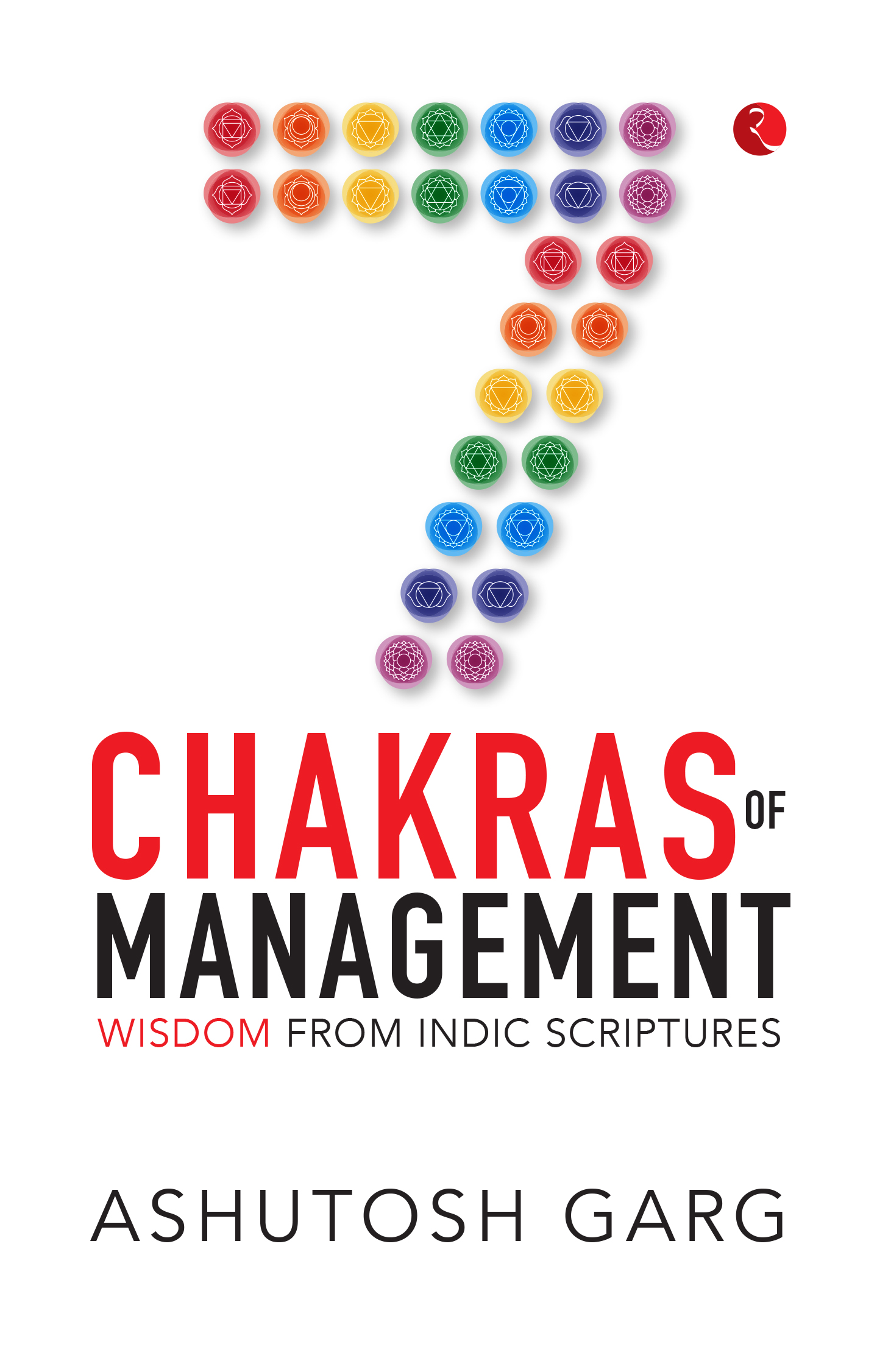An excerpt from Ashutosh Garg’s ‘7 Chakras of Management: Wisdom from Indic Scriptures’
7 Chakras of Management: Wisdom from Indic Scriptures
By Ashutosh Garg
Rupa Publications, 282 pages, Rs 595
 In the yoga philosophy, it is believed there are seven energy centres, called chakras, in our body, controlling and directing various kinds of energies. They are considered essential to our overall physical and mental well-being. Ashutosh Garg takes the metapho’sr of the chakras and converts them into a manual of wisdom, applicable to both personal and professional life.
In the yoga philosophy, it is believed there are seven energy centres, called chakras, in our body, controlling and directing various kinds of energies. They are considered essential to our overall physical and mental well-being. Ashutosh Garg takes the metapho’sr of the chakras and converts them into a manual of wisdom, applicable to both personal and professional life.
In ‘7 Chakras of Management’, renowned management expert and serial entrepreneur Ashutosh Garg reveals the seven essentials for managing organisations and businesses using principles from Indic scriptures.
• The Muladhara or the Root Chakra provides the stability and security necessary to navigate the uncertainties and challenges in a business.
• The Svadhisthana or the Sacral Chakra promotes social integration and creative expression.
• The Manipura or the Solar Plexus Chakra impacts confidence, clarity and the ability to take decisive action.
• The Anahata or the Heart Chakra promotes emotional intelligence, fosters self-awareness and compassion and allows businesses to connect with customers on a profound level.
• The Vishuddhi or the Throat Chakra ensures effective communication and establishes robust connections with stakeholders.
• The Ajna or the Third-Eye Chakra is considered the epicentre of intuition, insight and inner wisdom and plays a pivotal role in holistic awareness.
• The Sahasrara or Crown Chakra emphasizes universal consciousness and guides organisations to adopt an inclusive, sustainable and humane approach.
Understanding the relevance and impact of the seven chakras in our personal and professional lives is key to achieving a fulfilling life as well as supporting our professional life and our businesses—even startups—by introducing a culture that values and respects the person as much as the organisation.
Here is an excerpt from the chapter on Sahasrar Chakra:
SAHASRARA CHAKRA
Connecting Businesses with the People
The seventh and final is the Sahasrara or Crown Chakra, which fosters a sense of unity with the Divine and the Universe. When balanced, it allows us to experience states of heightened awareness, mindfulness and encourages us to seek a deeper understanding of our existence and align our actions with a higher purpose.
In Hindu scriptures, there is a Sanskrit phrase, Vasudhaiva Kutumbakam, which translates to ‘the world is one family’. It emphasizes the interconnectedness of all people and encourages the idea that every human being is part of a larger, global community. The Rig Veda and the Upanishads emphasize the importance of treating all human beings as equals and promoting unity among people of different backgrounds.
Diversity promotes the idea that it is a strength and that all people have value and are deserving of respect. It encourages people to embrace their differences and appreciate the unique qualities that each individual brings to the table.
Equity promotes the idea that every human being is entitled to equal rights and opportunities, regardless of their circumstances. It encourages people to work towards creating a more just and equitable society where all individuals have access to the resources they need to succeed.
Inclusion encourages people to create environments that are welcoming and inclusive of all individuals, regardless of their background. It promotes the idea that everyone has a place in society and that everyone should be able to participate fully in all aspects of life.
Diplomacy promotes the idea that cooperation and dialogue are key to resolving conflicts and promoting peace. It encourages people to view their relationships with others in a positive light and to seek mutually beneficial outcomes in all situations.
Legacy is not just material inheritance but the wisdom, values and actions one passes on. The principle of karma reinforces the notion that our deeds, both good and bad, leave an enduring impact on our soul and the cosmic order. The ultimate aim is to leave a legacy that aligns with dharma, ensuring spiritual growth and liberation (moksha) for oneself and inspiring others towards the same path.
‘Vasudhaiva Kutumbakam’ is a powerful concept that has significant implications for diversity, equity, inclusion, diplomacy and legacy. This idea emphasizes the interconnectedness of all people and encourages individuals to treat others with respect and compassion. It promotes a worldview that is inclusive and emphasizes the importance of working towards a more just and equitable society.
In today’s increasingly globalized world, this concept is more relevant than ever and can provide a powerful framework for creating a more peaceful and harmonious world, connecting businesses with the people.
DIVERSITY, EQUITY, INCLUSION
A wise person perceives the same divine principle or eternal soul (Atman) in every being, irrespective of the external differences or societal designations.
—Bhagavad Gita, Chapter 5, Verse 18
The phrase Vasudhaiva Kutumbakam, translating to ‘the world is one family’, embodies the basic philosophy of Hinduism.
Ayam Nijah paro veti gananaa laghu chetsam
Udarcharitanan tu vasudhaiva kutumbakam
—Maha Upanishad, Chapter 6, Verse 71
The above verse is engraved in the entrance hall of the Parliament of India and conveys that small-minded individuals see some as kin and others as strangers whereas the wise knows that the world is but one big family. Our scriptures have always referred to the world as one family.
GENDER EQUALITY
Goal 5 of the United Nations’ Sustainable Development Goals (SDGs) is gender equality. Further, Goal 10 is reduced inequalities, which has also been written about extensively in our scriptures.
Our scriptures have always treated men and women equally, with Hinduism teaching that the Divine is equally present in all. Prejudice and discrimination against anyone violates this fundamental teaching.
In traditional Indian astronomy, Rishika Arundhati—the wife of one of the seven seers Rishi Vasishtha—is accorded the same status as the seven seers. Together they are identified as the two stars in the twin-star system that are gravitationally bound to each other. In most twin-star systems, one is stationary while the other rotates around it. But Arundhati and Vasishtha travel the cosmos together by orbiting the same centre of mass, thus conveying equality in the relationship between men and women.
Arundhati was given a place in the Saptarshi constellation thousands of years ago. This was well before the world started to realize the importance of diversity, equity and inclusion.
GODDESSES
Goddesses have always been worshipped in our scriptures, which continue till today. The three deities worshipped in different forms across India are Saraswati, Lakshmi and Shakti, linked to the Trimurti (or the trinity of supreme divinity in Hinduism) of Brahma, Vishnu and Shiva, respectively.
Saraswati is the Goddess of Learning. She is usually shown holding a veena (a musical instrument), with a swan beside her. Saraswati is the consort of Brahma. Their son is Manu, the author of Manusmriti or the Laws of Manu. Saraswati is worshipped for knowledge.
Lakshmi is the Goddess of Wealth. She is normally shown holding lotus flowers, with a pot of money next to her. She is the consort of Vishnu. She is worshipped during festivals like Diwali.
Shakti is the Goddess representing divine feminine energy. She is worshipped as Parvati, the first wife of Shiva. Shakti is also worshipped in other forms—including Durga and Kali.
[The excerpt reproduced with the permission of the publishers.]
